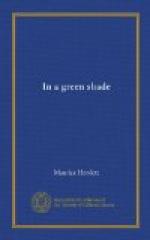And breath’d in me a voice divine
and clear
To sing the things that shall be, are,
and were.
Also they told him to sing of the blessed gods,
But ever of themselves both first and last,
and he obeyed them. When he won a tripod at Chalkis, in a singing contest, he dedicated it to his patronesses,
There where they first instilled clear song in me.
So he was a grateful poet, which is very unusual.
In Works and Days he sang of what he knew best, the country round, and sang it as a poet should who was also a shrewd farmer and thrifty husbandman. It is full of the love of earth and of the ways of them who lie closest in her bosom; but it is full of the wisdom, too, which such men win from their mother, and are not at all unwilling to impart. There is a good deal of Polonius in Hesiod, who addresses his Works and Days to his brother Perses, a bad lot. Perses in fact had diddled him out of his patrimony, or part of it, by bribing the judges at Thespiae; and the poet, who doesn’t mince matters, loses no opportunity of telling him what he thinks of him. Indeed, one of Hesiod’s reasons for instructing him in good farming was that thereby he might perhaps prevent him from spunging on his relations. So the injured bard got a sad, exalted pleasure out of his griefs, and something back, too, in his quiet way.
After a glance at the golden and other past ages he gets to work with a charming passage:
Whenas the Pleiads, Atlas’ daughters,
rise
Begin your harvest; when they hide their
eyes,
Then plow. For forty nights and forty
days
They are shrouded; then, as the year rounds,
they raise
Their shining heads what time unto the
stone
You lay your sickle’s edge—
and that is your time for harvesting. But you must work hard; for the law of the plains, of the seaboard, and of the upland dales is the same:
You who Demeter’s gifts will win
good cheap
Strip you to plow and sow, and strip to
reap—
and if you in particular, Perses, will do that, perhaps you won’t need to go begging at other men’s houses as you have begged at Hesiod’s. But he gives you warning that you will get no more out of him—than advice.
The Pleiades, however, don’t set till November, and before that there is October to be considered, the season of the rains. Get you into the woods in October and cut for your needs. And what might these be? Well, a mortar to pound your grain in, and a pestle to pound it withal; an axle for your wain, a beetle to break the clods. Then, for your plows, look out for a plow-tree of holm-oak: that is the best wood for them. Make two plows in case of accident, one all of a piece ([Greek: autogyon]), one jointed and dowelled. The pole should be of laurel or elm; the share must be oak. The [Greek: gues] is the plow-tree, and it is not always easy to find one ready-made—but get one if you can.




